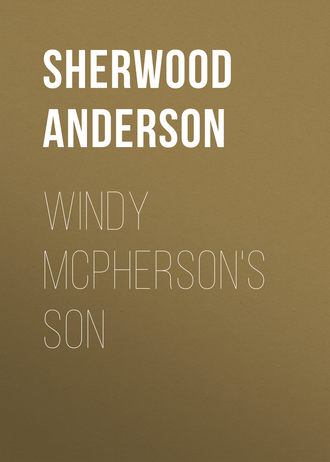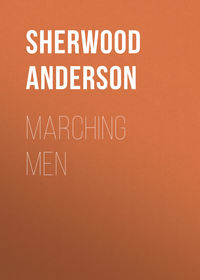 полная версия
полная версияWindy McPherson's Son
Suddenly Sam began wondering whether or not he would like to marry Sue Rainey. His mind played with the idea. He took it with him to bed, and it went with him all day in his hurried trips through offices and shops. The thought having come to him persisted, and he began seeing her in a new light. The odd half awkward little movements of her hands, and their expressiveness, the brown fine texture of her cheeks, the clearness and honesty of her grey eyes, the quick sympathy and understanding of his feeling for Janet, and the subtle flattery of the notion he had got that she was interested in him—all of these things came and went in his mind while he ran through columns of figures and laid plans for the expansion of the business of the Arms Company. Unconsciously he began to make her a part of his plans for the future.
Later, Sam discovered that during the days after the first talk together the thought of a marriage between them was in Sue’s mind also. After the talk she went home and stood for an hour before the glass studying herself and she once told Sam that in her bed that night she shed tears because she had never been able to arouse in a man the note of tenderness that had been in his voice when he talked to her of Janet.
And then two months after the first talk they had another. Sam, who had not allowed his grief over the loss of Janet or his nightly efforts to drown the sting of it in hard drinking, to check the big forward movement that he felt he was getting into the work of the offices and shops, sat one afternoon deeply absorbed in a pile of factory cost sheets. His shirt sleeves were rolled to the elbow, showing his white muscular forearms. He was absorbed, intent upon the sheets.
“I stepped in,” said a voice above his head.
Glancing up quickly, Sam sprang to his feet. “She must have been there some minutes looking down at me,” he thought, and had a thrill of pleasure in the thought.
Into his mind came the contents of the letter he had written her, and he wondered if after all he had been a fool, and whether the thoughts of a marriage with her were but vagaries. “Perhaps it would not be attractive to either her or myself when we came up to it,” he decided.
“I stepped in,” she began again. “I have been thinking. Some things you said—in the letter and when you talked of your friend Janet who died—some things of men and women and work. You may not remember them. I—I got interested. I—are you a socialist?”
“I believe not,” Sam answered, wondering what had given her that thought. “Are you?”
She laughed and shook her head.
“Just what are you?” she went on. “What do you believe? I am curious to know. I thought your note—you will pardon me—I thought it a kind of pretence.”
Sam winced. A shadow of doubt of the sincerity of his business philosophy crossed his mind accompanied by the swaggering figure of Windy McPherson. He came around the desk and leaning against it looked at her. His secretary had gone out of the room and they were alone together. Sam laughed.
“There was a man in the town where I was raised used to say that I was a little mole working underground, intent upon worms,” he said, and then, waving his arms toward the papers on the desk, added, “I am a business man. Isn’t that enough? If you could go with me through some of these cost sheets you would agree they are needed.”
He turned and faced her again.
“What should I be doing with beliefs?” he asked.
“Well, I think you have them—some kind of beliefs,” she insisted, “you must have them. You get things done. You should hear the men talk of you. Sometimes at the house they are quite foolish about what a wonderful fellow you are and what you are doing here. They say that you drive on and on. What drives you? I want to know.”
For the moment Sam half suspected that she was secretly laughing at him. Finding her quite serious he started to reply and then stopped, regarding her.
The silence between them went on and on. A clock on the wall ticked loudly.
Sam stepped nearer to her and stood looking down into the face she slowly turned up to his.
“I want to have a talk with you,” he said, and his voice broke. He had the illusion of a hand gripping at his throat.
In a flash he had definitely decided that he would try to marry her. Her interest in the motives of his life had clinched the sort of half decision he had made. In an illuminating moment during the prolonged silence between them he had seen her in a new light. The feeling of vague intimacy brought to him by his thoughts of her became a fixed belief that she belonged to him—was a part of him—and he was charmed with her manner, and her person, standing there, as with a gift given him.
And then into his mind came a hundred other thoughts, clamouring thoughts, come out of the hidden parts of him. He began to think that she could lead the way on a road he wanted to travel. He thought of her wealth and what it would mean to a man filled with his hunger for power. And through these thoughts shot others. Something in her had taken hold of him—something that had been also in Janet. He was curious concerning her curiosity about his beliefs, and wanted to question her concerning her own beliefs. He could see none of Colonel Tom’s blustering incompetence in her and thought her filled with truth as a deep spring is filled with clear water. He believed she would give him something, something that all his life he had been wanting. An old aching hunger that had haunted his nights as a boy came back and he thought that at her hand it might be fed.
“I—I must read a book about socialism,” he said lamely.
Again they stood in silence, she looking at the floor, he past her head and out at the window. He could not bring himself to speak again of the proposed talk. He had a boyish dread of having her notice the tremor in his voice.
Colonel Tom came into the room, bursting with an idea Sam had given him at the lunch hour and which in working its way into his mind had become to the colonel’s entirely honest belief an idea of his own. The interruption brought to Sam an intense feeling of relief and he began talking of the colonel’s idea as though it had taken him unawares.
Sue, walking to a window, began tying and untying the curtain cord. When Sam, raising his eyes, looked at her, he caught her eyes watching him intently and she smiled, continuing to look at him squarely. It was his eyes that first broke away.
From that day Sam’s mind was afire with thoughts of Sue Rainey. In his room he sat, or going into Grant Park stood by the lake, looking at the silent, moving water as he had looked in the days when he first came to the city. He did not dream of having her in his arms or of kissing her lips; he thought, instead, with a glowing heart, of a life lived with her. He wanted to walk beside her through the streets, to have her come suddenly in at his office door, to look into her eyes and to have her question him, as she had questioned, concerning his beliefs and his hopes. He thought that in the evening he would like to go to a house of his own and find her sitting there waiting for him. All the charm of his aimless, half-dissolute way of life died in him, and he believed that with her he could begin to live more fully and completely. From the moment when he had definitely decided that he wanted Sue as a wife, Sam stopped overdrinking, going to his room or walking through the streets or in the parks instead of seeking his old companions in the clubs and drinking places. Sometimes pushing his bed to the window overlooking the lake, he would undress immediately after dinner and opening the window would spend half the night watching the lights of boats far away over the water and thinking of her. He would imagine her in the room, moving here and there, and coming occasionally to put her hand in his hair and look down at him as Janet had done, helping by her sane talk and quiet ways to get his life straightened out for good living.
And when he had fallen asleep the face of Sue Rainey came to visit his dreams. One night he thought she had become blind and sat in the room with sightless eyes saying over and over like one demented, “Truth, truth, give me back the truth that I may see,” and he awoke sick with horror at the thought of the look of suffering that had been in her face. Never did Sam dream of having her in his arms or of raining kisses on her lips and neck as he had dreamed of other women who in the past had won his favour.
For all that he thought of her so constantly and built so confidently his dream of a life to be spent with her, months passed before he saw her again. Through Colonel Tom he learned that she had gone for a visit to the East and he went earnestly about his work, keeping his mind on his business during the day and only in the evening allowing himself to become absorbed in thoughts of her. He had a feeling that although he had said nothing she knew of his desire for her and that she wanted time to think it over. Several times in the evening in his room he wrote her long letters filled with minute, boyish explanations of his thoughts and motives, letters which after writing he immediately destroyed. A woman of the west side, with whom he had once had an affair, met him one day on the street, and put her hand familiarly on his arm and for the moment reawakened in him an old desire. After leaving her he did not go back to the office, but taking a south-bound car, spent the afternoon walking in Jackson Park, watching the children at play on the grass, sitting on benches under the trees, getting out of his body and his mind the insistent call of the flesh that had come back to him.
Then in the evening, he came suddenly upon Sue riding a spirited black horse in a bridle path at the upper end of the park. It was just at the grey beginning of night. Stopping the horse, she sat looking at him and going to her he put a hand on the bridle.
“We might have that talk,” he said.
She smiled down at him and the colour began to rise in her brown cheeks.
“I have been thinking of it,” she said, the familiar serious look coming into her eyes. “After all what have we to say to each other?”
Sam watched her steadily.
“I have a lot of things to say to you,” he announced. “That is to say—well—I have, if things are as I hope.” She got off the horse and they stood together by the side of the path. Sam never forgot the few minutes of silence that followed. The wide prospects of green sward, the golf player trudging wearily toward them through the uncertain light, his bag upon his shoulder, the air of physical fatigue with which he walked, bending slightly forward, the faint, soft sound of waves washing over a low beach, and the intense waiting look on the face she turned up to him, made an impression on his mind that stayed with him through life. It seemed to him that he had arrived at a kind of culmination, a starting point, and that all the vague shadowy uncertainties that had, in reflective moments, flitted through his mind, were to be brushed away by some act, some word, from the lips of this woman. With a rush he realised how consistently he had been thinking of her and how enormously he had been counting on her falling in with his plans, and the realisation was followed by a sickening moment of fear. How little he actually knew of her and of her way of thought. What assurance had he that she would not laugh, jump back upon the horse, and ride away? He was afraid as he had never been afraid before. Dumbly his mind groped about for a way to begin. Expressions he had caught and noted in her strong serious little face when he had achieved but a mild curiosity concerning her came back to visit his mind and he tried desperately to build an instant idea of her from these. And then turning his face from her he plunged directly into his thoughts of the past months as though she had been sharing talking to the colonel.
“I have been thinking we might marry, you and I,” he said, and cursed himself for the blundering bluntness of the declaration.
“You do get things done, don’t you?” she replied, smiling.
“Why should you have been thinking anything of the sort?”
“Because I want to live with you,” he said; “I have been talking to the colonel.”
“About marrying me?” She seemed about to begin laughing.
He hurried on. “No, not that. We talked about you. I could not let him alone. He might have known. I kept making him talk. I made him tell me about your ideas. I felt I had to know.”
Sam faced her.
“He thinks your ideas absurd. I do not. I like them. I like you. I think you are beautiful. I do not know whether I love you or not, but for weeks I have been thinking of you and clinging to you and saying over and over to myself, ‘I want to live my life with Sue Rainey.’ I did not expect to go at it this way. You know me. What you do not know I will tell you.”
“Sam McPherson, you are a wonder,” she said, “and I do not know but that I will marry you in the end, but I can’t tell now. I want to know a lot of things. I want to know if you are ready to believe what I believe and to live for what I want to live.”
The horse, growing restless, began tugging at the bridle and she spoke to him sharply. She plunged into a description of a man she had seen on the lecture platform during her visit to the East and Sam looked at her with puzzled eyes.
“He was beautiful,” she said. “He was past sixty but looked like a boy of twenty-five, not in his body, but in an air of youth that hung over him. He stood there before the people talking, quiet, able, efficient. He was clean. He had lived clean, body and mind. He had been companion and co-worker with William Morris, and once he had been a mine boy in Wales, but he had got hold of a vision and lived for it. I did not hear what he said, but I kept thinking, ‘I want a man like that.’
“Can you accept my beliefs and live for what I want to live?” she persisted.
Sam looked at the ground. It seemed to him that he was going to lose her, that she would not marry him.
“I am not accepting beliefs or ends in life blindly,” he said stoutly, “but I want them. What are your beliefs? I want to know. I think I haven’t any myself. When I reach for them they are gone. My mind shifts and changes. I want something solid. I like solid things. I want you.”
“When can we meet and talk everything over thoroughly?”
“Now,” answered Sam bluntly, some look in her face changing his whole viewpoint. Suddenly it seemed as though a door had been opened, letting in a strong light upon the darkness of his mind. His confidence had come back to him. He wanted to strike and keep on striking. The blood rushed through his body and his brain began working rapidly. He felt sure of ultimate success.
Taking her hand, and leading the horse, he began walking with her along the path. Her hand trembled in his and as though answering a thought in his mind she looked up at him and said,
“I am not different from other women, although I do not accept your offer. This is a big moment for me, perhaps the biggest moment of my life. I want you to know that I feel that, though I do want certain things more than I want you or any other man.”
There was a suggestion of tears in her voice and Sam had a feeling that the woman in her wanted him to take her into his arms, but something within him told him to wait and to help her by waiting. Like her he wanted something more than the feel of a woman in his arms. Ideas rushed through his head; he thought that she was going to give him some bigger idea than he had known. The figure she had drawn for him of the old man who stood on the platform, young and beautiful, the old boyish need of a purpose in life, the dreams of the last few weeks—all of these were a part of the eager curiosity in him. They were like hungry little animals waiting to be fed. “We must have it all out here and now,” he told himself. “I must not let myself be swept away by a rush of feeling and I must not let her be.
“Do not think,” he said, “that I haven’t tenderness for you. I am filled with it. But I want to have our talk. I want to know what you expect me to believe and how you want me to live.”
He felt her hand stiffen in his.
“Whether or not we are worth while to each other,” she added.
“Yes,” he said.
And then she began to talk, telling him in a quiet steady voice that steadied something in him what she wanted to make out of her life. Her idea was one of service to mankind through children. She had seen girl friends of hers, with whom she had gone to school, grow up and marry. They had wealth and education, fine well-trained bodies, and they had been married only to live lives more fully devoted to pleasure. One or two who had married poor men had only done so to satisfy a passion in themselves, and after marriage had joined the others in the hungry pursuit of pleasure.
“They do nothing at all,” she said, “to repay the world for the things given them, the wealth and well-trained bodies and the disciplined minds. They go through life day after day and year after year wasting themselves and come in the end to nothing but indolent, slovenly vanity.”
She had thought it all out and had tried to plan for herself a life with other ends, and wanted a husband in accord with her ideas.
“That isn’t so difficult,” she said, “I can find a man whom I can control and who will believe as I believe. My money gives me that power. But I want him to be a real man, a man of ability, a man who does things for himself, one fitted by his life and his achievements to be the father of children who do things. And so I began thinking about you. I got the men who come to the house to talk of you.”
She hung her head and laughed like a bashful boy.
“I know much of the story of your early life out in that Iowa town,” she said. “I got the story of your life and your achievements out there from some one who knew you well.”
The idea seemed wonderfully simple and beautiful to Sam. It seemed to add tremendously to the dignity and nobility of his feeling for her. He stopped in the path and swung her about facing him. They were alone in that end of the park. The soft darkness of the summer night had settled over them. In the grass at their feet a cricket sang loudly. He made a movement to take her into his arms.
“It is wonderful,” he said.
“Wait,” she demanded, putting her hand against his shoulder. “It isn’t so simple. I am wealthy. You are able and you have a kind of undying energy in you. I want to give both my wealth and your ability to children—our children. That will not be easy for you. It means giving up your dreams of power. Perhaps I shall lose courage. Women do after two or three have come. You will have to furnish that. You will have to make a mother of me and keep making a mother of me. You will have to be a new kind of father with something maternal in you. You will have to be patient and studious and kind. You will have to think of these things at night instead of thinking of your own advancement. You will have to live wholly for me because I am to be their mother, giving me your strength and courage and your good sane outlook on things. And then when they come you will have to give all these things to them day after day in a thousand little ways.”
Sam took her into his arms and for the first time in his memory the hot tears stood in his eyes.
The horse, unattended, wheeled, threw up his head and trotted off down the path. They let him go, walking along after him hand in hand like two happy children. At the entrance to the park they came up to him, held by a park policeman. She got on the horse and Sam stood beside her looking up.
“I’ll tell the colonel in the morning,” he said.
“What will he say?” she murmured, musingly.
“Damned ingrate,” Sam mimicked the colonel’s blustering throat tones.
She laughed and picked up the reins. Sam laid his hand on hers.
“How soon?” he asked.
She put her head down near his.
“We’ll waste no time,” she said, blushing.
And then in the presence of a park policeman, in the street by the entrance to the park with the people passing up and down, Sam had his first kiss from Sue Rainey’s lips.
After she rode away Sam walked. He had no sense of the passing of time, wandering through street after street, rearranging and readjusting his outlook on life. What she had said had stirred every vestige of sleeping nobility in him. He thought that he had got hold of the thing he had unconsciously been seeking all his life. His dreams of control of the Rainey Arms Company and the other big things he had planned in business seemed, in the light of their talk, so much nonsense and vanity. “I will live for this! I will live for this!” he kept saying over and over to himself. He imagined he could see the little white things lying in Sue’s arms, and his new love for her and for what they were to accomplish together ran through him and hurt him so that he felt like shouting in the darkened streets. He looked up at the sky and saw the stars and thought they looked down on two new and glorious beings living on the earth.
At a corner he turned and came into a quiet residence street where frame houses stood in the midst of little green lawns and thoughts of his boyhood in the Iowa town came back to him. And then his mind moving forward, he remembered nights in the city when he had stolen away to the arms of women. Hot shame burned in his cheeks and his eyes felt hot.
“I must go to her—I must go to her at her house—now—tonight—and tell her all of these things, and beg her to forgive me,” he thought.
And then the absurdity of such a course striking him he laughed aloud.
“It cleanses me! this cleanses me!” he said to himself.
He remembered the men who had sat about the stove in Wildman’s grocery when he was a boy and the stories they sometimes told. He remembered how he, as a boy in the city, had run through the crowded streets fleeing from the terror of lust. He began to understand how distorted, how strangely perverted, his whole attitude toward women and sex had been. “Sex is a solution, not a menace—it is wonderful,” he told himself without knowing fully the meaning of the word that had sprung to his lips.
When, at last, he turned into Michigan Avenue and went toward his apartment, the late moon was just mounting the sky and a clock in one of the sleeping houses was striking three.
CHAPTER VI
One evening, six weeks after the talk in the gathering darkness in Jackson Park, Sue Rainey and Sam McPherson sat on the deck of a Lake Michigan steamer watching the lights of Chicago blink out in the distance. They had been married that afternoon in Colonel Tom’s big house on the south side; and now they sat on the deck of the boat, being carried out into darkness, vowed to motherhood and to fatherhood, each more or less afraid of the other. They sat in silence, looking at the blinking lights and listening to the low voices of their fellow passengers, also sitting in the chairs along the deck or strolling leisurely about, and to the wash of the water along the sides of the boat, eager to break down a little reserve that the solemnity of the marriage service had built up between them.
A picture floated in Sam’s mind. He saw Sue, all in white, radiant and wonderful, coming toward him down a broad stairway, toward him, the newsboy of Caxton, the smuggler of game, the roisterer, the greedy moneygetter. All during those six weeks he had been waiting for this hour when he should sit beside the little grey-clad figure, getting from her the help he wanted in the reconstruction of his life. Without being able to talk as he had thought of talking, he yet felt assured and easy in his mind. In the moment when she had come down the stairway he had been half overcome by a feeling of intense shame, a return of the shame that had swept over him that night when she had given her word and he had walked hour after hour through the streets. It had seemed to him that from among the guests standing about should arise a voice crying, “Stop! Do not go on! Let me tell you of this fellow—this McPherson!” And then he had seen her holding to the arm of swaggering, pretentious Colonel Tom and he had taken her hand to become one with her, two curious, feverish, strangely different human beings, taking a vow in the name of their God, with the flowers banked about them and the eyes of people upon them.
When Sam had gone to Colonel Tom the morning after that evening in Jackson Park, there had been a scene. The old gun maker had blustered and roared and forbidden, pounding on his desk with his fist. When Sam remained cool and unimpressed, he had stormed out of the room slamming the door and shouting, “Upstart! Damned upstart!” and Sam had gone smiling back to his desk, mildly disappointed. “I told Sue he would say ‘Ingrate,’” he thought, “I am losing my skill at guessing just what he will do and say.”






